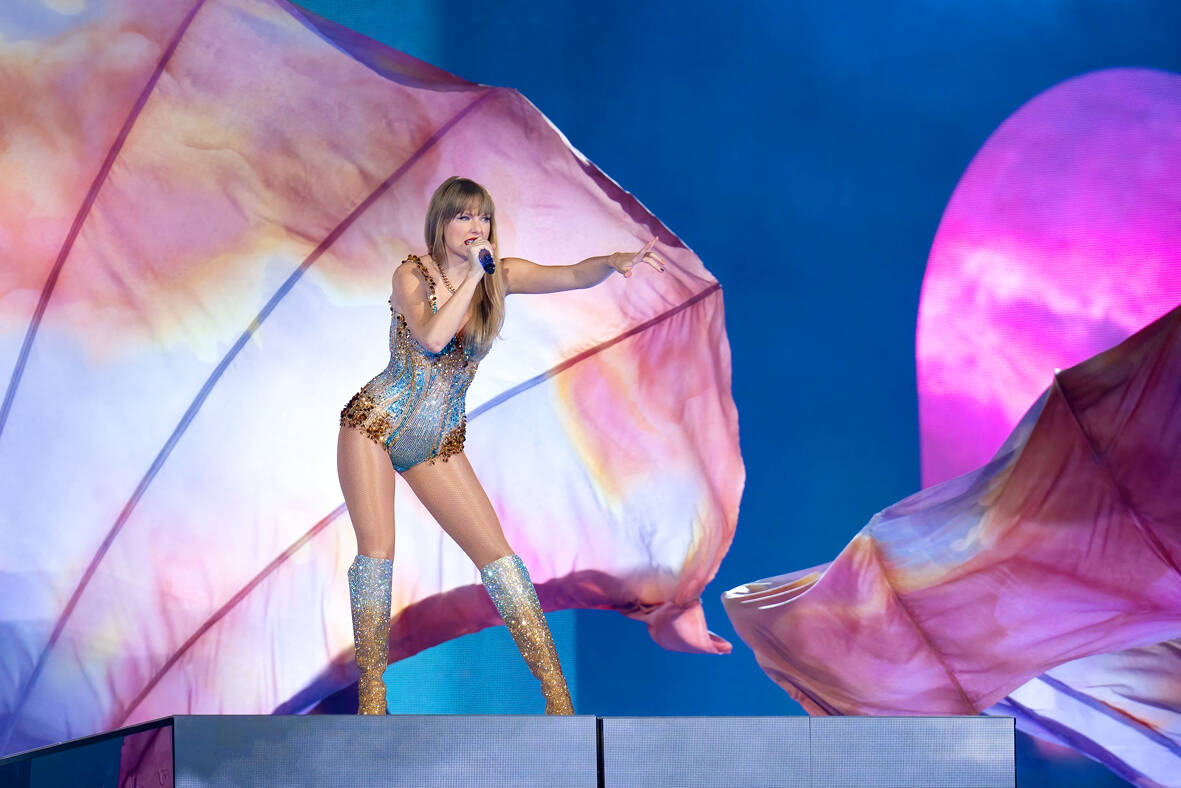It can be a painful thing, acknowledging that our heroes are both human and flawed, but Ezra Edelman spent five years doing just that. The film-maker behind 2016’s sprawling, Oscar-winning OJ: Made in America, was at work for Netflix on what, by all accounts, would have been the definitive Prince documentary: a nine-hour behemoth drawing upon dozens of interviews with the late icon’s associates and rare access to his personal archive.
The film — according to the few who’ve seen a rough cut — built a layered portrait of Prince’s immense genius and complexities, including a darker side concealed by his playfully eccentric persona: his allegedly cruel treatment of girlfriends and female proteges; his demanding ruthlessness as a bandleader.
“We’re asked to sit with Prince’s multiplying paradoxes for many hours, allowing them to unsettle one another,” wrote Sasha Weiss, of the New York Times Magazine, after viewing it.

Photo: AFP
We won’t, unfortunately, get that opportunity. In February, Netflix scrapped Edelman’s documentary after executors of Prince’s estate, reportedly upset by its content, fought for months to block its release. The streaming platform plans to develop “a new documentary featuring exclusive content from Prince’s archive.” In other words: a watered-down take, to placate the powers that be.
This dispiriting saga reveals much about the bleak state of the celebrity documentary complex in 2025: they are plentiful on streaming platforms yet increasingly indistinguishable from sponsored content. In raw numbers, documentaries are more popular than ever, but they also feel more toothless and risk-averse. Netflix’s capitulation lays it all out in the open, reflecting a climate in which dull, sanitized celebrity docs flood the marketplace while distributors balk at complicated and/or unauthorized films providing complex portraits of their subjects.
The Book of Prince frightened Prince’s estate because they couldn’t control it. But some of the most compelling music docs in recent memory are animated by singular directorial perspectives, not transactional access. That includes Questlove’s fascinating Sly Lives!, which uses the rise and fall of enigmatic funk legend Sly Stone as a vehicle to explore cultural pressures on Black pop stars. By comparison, the band-authorized Becoming Led Zeppelin feels like a work of sheer legacy-minded mythmaking. The performance footage is electric, but interviews with the surviving members steer away from squirmy subjects, like plagiarism charges or underage groupies; complicating wrinkles are smoothed over.
There’s a blurring line between journalism and PR fluff in documentaries lately. It is increasingly common for celebrities to produce, or play a significant behind-the-scenes role, in documentaries about themselves. If the gold standard for this category is Beyonce’s concert films, then Netflix’s Harry & Meghan, a six-hour exercise in brand management, made with their own production company, may represent the nadir. As Edelman put it, viewers are “being served slop.”
In 2020, Hulu released a four-part series on Hillary Clinton, obscuring the fact that Clinton had chosen the production company and had input over the editing process. Similarly, Taylor Swift selected the director of 2020 documentary Miss Americana, a fitfully revealing glimpse behind the scenes of the Swift empire, then went on to make 2023’s massively successful Eras Tour movie through her own production company.
The problem isn’t that such films exist; it’s that they suck up all the oxygen — and money — from documentary distribution. In recent years, streaming services have filled up with docs about beloved celebrities, some quite worthwhile (2020’s Zappa, 2021’s Tina), others blandly reverential (Albert Brooks: Defending My Life, Thank You, Goodnight: The Bon Jovi Story).
Entertainment companies gobble up fawning documentaries about public figures, but won’t touch anything controversial. Consider that Leaving Neverland, HBO’s bombshell 2019 film investigating child abuse allegations against Michael Jackson, has effectively disappeared. It was permanently removed from Max after a lawsuit from Jackson’s estate — a troubling omen, as Slate’s Sam Adams argues, “at a time when media access is under the near-total control of streaming conglomerates.” (A sequel, Leaving Neverland 2, hit YouTube recently to minimal fanfare.)
A similar dynamic threatens to spread to the literary world. Last year, the influential rap group De La Soul denounced a book about them by music journalist Marcus J Moore and claimed to be “exploring all of our legal options.” In a higher-profile case, Meta recently sued to block promotion of a tell-all memoir from a former employee, an effort that backfired deliciously. It will be an impoverished world where authors fear to publish unauthorized biographies because they can’t afford to be sued by the subject.
The corporate culture of capitulation has only worsened since Trump’s re-election. In December, ABC News agreed to pay US$15 million to settle what some consider a frivolous lawsuit from Trump. In April, the executive producer of 60 Minutes resigned, saying his journalistic integrity had been compromised by corporate higher-ups, who have been considering their own Trump settlement.
No wonder film companies fear releasing anything that might upset the tweeter-in-chief. Consider that last year’s sleazily gripping Trump biopic The Apprentice struggled to find a domestic distributor until a small company, Briarcliff Entertainment, stepped in. (Briarcliff’s founder argued that the bigger studios had spurned it “strictly based on cowardice.”) Consider, too, that the remarkable documentary No Other Land, which won an Oscar for its wrenching depiction of Palestinian life in the occupied West Bank, still doesn’t have a proper US distributor.
Meanwhile, Amazon Prime (whose parent company recently donated to Trump’s inauguration, which its CEO Jeff Bezos personally attended) is spending US$40 million to make a Melania Trump vanity documentary, from which the first lady will reportedly profit. Projects like that are closer to propaganda than journalism, and this one’s being bankrolled and legitimized by one of the largest and most powerful streaming companies in the entertainment industry.
Documentaries ought to challenge and hold power to account more than they flatter. Instead, in a landscape where a few streaming companies owned or run by billionaires dominate the documentary market in the US, viewers are paying the price.

The Lee (李) family migrated to Taiwan in trickles many decades ago. Born in Myanmar, they are ethnically Chinese and their first language is Yunnanese, from China’s Yunnan Province. Today, they run a cozy little restaurant in Taipei’s student stomping ground, near National Taiwan University (NTU), serving up a daily pre-selected menu that pays homage to their blended Yunnan-Burmese heritage, where lemongrass and curry leaves sit beside century egg and pickled woodear mushrooms. Wu Yun (巫雲) is more akin to a family home that has set up tables and chairs and welcomed strangers to cozy up and share a meal

Dec. 8 to Dec. 14 Chang-Lee Te-ho (張李德和) had her father’s words etched into stone as her personal motto: “Even as a woman, you should master at least one art.” She went on to excel in seven — classical poetry, lyrical poetry, calligraphy, painting, music, chess and embroidery — and was also a respected educator, charity organizer and provincial assemblywoman. Among her many monikers was “Poetry Mother” (詩媽). While her father Lee Chao-yuan’s (李昭元) phrasing reflected the social norms of the 1890s, it was relatively progressive for the time. He personally taught Chang-Lee the Chinese classics until she entered public

Last week writer Wei Lingling (魏玲靈) unloaded a remarkably conventional pro-China column in the Wall Street Journal (“From Bush’s Rebuke to Trump’s Whisper: Navigating a Geopolitical Flashpoint,” Dec 2, 2025). Wei alleged that in a phone call, US President Donald Trump advised Japanese Prime Minister Sanae Takaichi not to provoke the People’s Republic of China (PRC) over Taiwan. Wei’s claim was categorically denied by Japanese government sources. Trump’s call to Takaichi, Wei said, was just like the moment in 2003 when former US president George Bush stood next to former Chinese premier Wen Jia-bao (溫家寶) and criticized former president Chen

President William Lai (賴清德) has proposed a NT$1.25 trillion (US$40 billion) special eight-year budget that intends to bolster Taiwan’s national defense, with a “T-Dome” plan to create “an unassailable Taiwan, safeguarded by innovation and technology” as its centerpiece. This is an interesting test for the Chinese Nationalist Party (KMT), and how they handle it will likely provide some answers as to where the party currently stands. Naturally, the Lai administration and his Democratic Progressive Party (DPP) are for it, as are the Americans. The Chinese Communist Party (CCP) is not. The interests and agendas of those three are clear, but